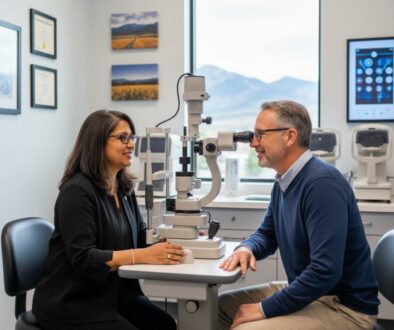5 Common Eye Issues in Children and How Early Intervention Can Help
Wondering if your child needs a pediatric eye exam in Fort Collins? Discover how early vision screenings can detect hidden issues and set kids up for lifelong visual success.
At Poudre Valley EyeCare in Fort Collins, CO, our experienced optometrists specialize in children’s eye exams to ensure young eyes develop healthily. Clear vision helps kids thrive:
-
Reduced frustration in classrooms, sports, and play
-
Confidence in depth-perception activities (reading, catching balls)
-
Early detection of vision issues for better long-term outcomes
Key Takeaways
-
Early detection is vital: Many serious childhood vision issues—like amblyopia and strabismus—show few symptoms and are often only caught during routine eye exams.
-
Vision affects learning and behavior: Undiagnosed problems like convergence insufficiency or eye tracking issues are frequently mistaken for learning disorders or attention deficits.
-
Specialized therapy works: Custom vision therapy programs at Poudre Valley EyeCare have shown success rates over 75–90% in improving eye coordination, tracking, and reading fluency.
-
Screen time matters: Increased digital use can worsen symptoms of convergence insufficiency and eye strain, especially in young students.
-
Not all vision problems are obvious: Some conditions, like congenital cataracts, may cause no noticeable symptoms yet still affect long-term development.
1. Amblyopia (Lazy Eye) in Children
Amblyopia (“lazy eye”) is the #1 cause of childhood vision impairment (per the National Eye Institute). It develops when one eye is stronger, causing the brain to ignore signals from the weaker eye.
Spotting Amblyopia Symptoms in Kids:
-
Frequent squinting or eye rubbing
-
Covering one eye while reading or playing
-
No obvious signs? Many cases are only caught during back-to-school eye exams or pediatric vision screenings at our Fort Collins clinic—no guilt needed!
Early Correction is Critical:
Our Poudre Valley EyeCare optometrists treat amblyopia with:
-
Custom glasses/contacts to balance vision
-
Medical-grade eye patches to retrain the weaker eye
Early intervention prevents permanent vision issues.
2. Strabismus (Crossed Eyes) in Fort Collins Kids
Strabismus occurs when eye muscles work unevenly, causing misalignment (one eye turning inward/outward). Severity varies—early detection at Poudre Valley EyeCare prevents vision complications.
Recognizing Strabismus Symptoms:
-
Eyes pointing in different directions
-
Intermittent or constant eye turns
-
Switching of the “dominant” eye
Personalized Strabismus Treatments:
After a comprehensive pediatric eye exam in Fort Collins, our specialists may recommend:
-
Corrective lenses or medicated drops to strengthen weaker eyes
-
Collaboration with pediatric ophthalmologists for precise muscle surgery (tightening/loosening tissues)
3. Convergence Insufficiency: Fort Collins Treatment
Convergence insufficiency disrupts near-focus coordination when nerves fail to synchronize eye movement. One eye may drift during close tasks like reading.
Key Symptoms in Children:
-
Reading struggles or avoiding near-work
-
Double vision, headaches, or eye strain
-
Declining school performance (often mistaken for learning disorders)
-
Worsened by screen time – a critical concern for digital-age kids
Proven Treatment at Poudre Valley EyeCare:
Our Fort Collins optometrists specialize in:
Personalized vision therapy – in-office exercises to retrain eye teamwork
75%+ success rate restoring comfortable near vision
Early intervention prevents academic setbacks.
4. Eye Tracking Problems: Fort Collins Diagnosis & Care
Eye tracking enables smooth visual following of text or moving objects. When impaired, children experience jerky focus shifts or “lost place” episodes.
Key Warning Signs in Fort Collins Kids:
-
Reading struggles: Skipping words/lines, finger-tracking sentences
-
Sports challenges: Difficulty catching balls or tracking fast motion
-
Misdiagnosis risk: Often labeled “slow readers” despite 20/20 vision
Specialized Treatment at Poudre Valley EyeCare:
Our neuro-optometric vision therapy in Fort Collins includes:
Custom eye-movement exercises to build tracking precision
Reading fluency training for academic confidence
Sports vision drills for coordination
90% of patients show measurable improvement within 8 weeks.
5. Congenital Cataracts: Early Intervention in Fort Collins
Contrary to popular belief, cataracts aren’t exclusive to older adults. Children can be born with them (congenital) or develop them young.
Key Symptoms & Risks:
-
Blurry/double vision in one or both eyes
-
No symptoms? Some cause zero vision changes
-
Critical: Can trigger other childhood eye conditions (like those listed above)
Personalized Treatment at Poudre Valley EyeCare:
Our Fort Collins pediatric optometrists:
Monitor carefully using retinal imaging and developmental tracking
Recommend surgery ONLY if vision is affected
Coordinate with pediatric surgeons for seamless care if needed
Conclusion: Eye Exams Help Catch Vision Issues Early
Regular eye exams for kids go a long way towards catching problems early, when corrections are easiest to make. Whether or not you have a family history of vision problems, making sure your child’s eyes are regularly evaluated can help save them from unnecessary struggle.
If you have concerns or questions about your child’s vision, contact our office to set up an appointment with a periodic optometrist. We’re always happy to see our youngest patients and set them up for a lifetime of healthy vision!
Dr. Eric Torgerson
Owner at Poudre Valley Eyecare
Dr. Eric Torgerson is the owner of Poudre Valley Eyecare, and has been recognized for his contributions to optometry and his commitment to community health through various roles and accolades within the Northern Colorado Optometric Society and the Colorado Optometric Association.
Why Choose Us?
Our advanced technology and individualized care deliver results for patients of all ages. Our routine exams allow us to spot changes in your vision and allow us to treat those changes early. We have a comprehensive understanding of eye care, which means we can treat a wide range of conditions and chronic diseases. Our in-depth routine exams and customized treatment plans set us apart from the rest.


FAQs
-
The most common eye issues in children include myopia (nearsightedness), hyperopia (farsightedness), amblyopia (lazy eye), strabismus (crossed eyes), and conjunctivitis (pink eye)
Please note: None of the above should be considered medical advice. If you’re having any concerns about your vision, please reach out to us immediately or see your primary care provider.




